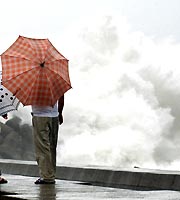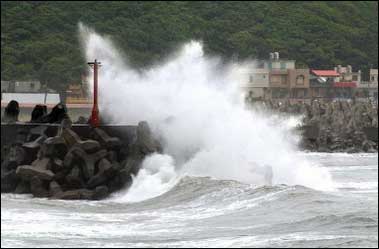 |
 |
|
Deals by bank stars transform China economy
By David Barboza (iht.com/The New York Times)
Updated: 2005-07-19 09:26
They grew up during China's Cultural Revolution, when Mao
Zedong's political campaigns in the 1960s and 1970s tore apart families,
pitting children against their parents and husbands against wives.
But
now they are among the most powerful deal makers in China, a group of rich and
politically savvy investment bankers who are helping transform China's economy
and restructuring some of the country's biggest corporations.
Every major
investment bank now has a Chinese-born star.
Goldman Sachs has Fang
Fenglei, Merrill Lynch has Ehrfei Liu, Morgan Stanley has Jonathan Zhu, J.P.
Morgan has Charles Li and Citigroup has Wei Christianson.
They are so
powerful and so sought after by Wall Street's biggest firms that their pay
packages can reach $10 million a year after bonuses.
The major Wall
Street investment banks generally decline to talk about how their top-level
bankers operate. And indeed few of the Wall Street banks would agree to comment
publicly for this article.
But a great deal is known about these fairly
secretive bankers.
Most of them journeyed west in the 1980s to study in
the United States. They have since returned home to play important roles in a
growing number of cross-border megadeals.
They were behind the scenes,
for example, when Lenovo, China's biggest computer maker, purchased IBM's
personal computer business. They are now pushing Haier, China's biggest
appliance maker, to bid for Maytag. And a few weeks ago, two Chinese-born
bankers were at the center of things when CNOOC, one of the huge state-owned oil
companies, made a blockbuster $18.5 billion bid for Unocal.
That deal
alone could earn lawyers and investment bankers as much as $300 million in
fees.
It has been a long, sometimes tough road for these bankers. For
years, Westerners called the shots at investment banks operating in China, and
they still do to some extent. Even now, their relationships and navigational
skills are arguably more valuable than their hard-core banking skills.
But in the past year, Chinese-born bankers have been a driving a force
in a growing number of high-profile global deals.
"These are the new
deal makers," said Jack Huang, head of the Greater China practice at the law
firm Jones Day. "Morgan Stanley, Merrill Lynch, Goldman Sachs. Look at their
organizational chart and you'll see a lot of Chinese-born bankers at the junior
and senior level now. It wasn't always like that."
The new power brokers
have a lot in common: They are mostly in their 40s, born in China and educated
in the United States; they were raised as communists but schooled in capitalism.
Of course, the large banks like to insist they are not operating under a
star system.
But these bankers are paid handsomely, the firms say, because
they can get access to the powers that be and then navigate the complex byways
of east-west deal making.
"These people are rainmakers and
well-respected inside the bank," said Marie Cheung, a spokeswoman at J.P.
Morgan's Hong Kong office.
It may not come as a surprise that
Chinese-born bankers are the new power brokers in China. But for years, they
often played second fiddle to businessmen from Hong Kong, Taiwan, Singapore or
the West. The balance of power is shifting, and at the highest levels of deal
making, the pedigrees are unmistakably Chinese.
Charles Li worked in the
offshore oil fields of northern China in the late 1970s for the predecessor
company to CNOOC. Now he is the top banker in China for J.P. Morgan and one of
the lead deal makers behind Cnooc's huge takeover bid for
Unocal.
Shanghai-born Jonathan Zhu studied Wordsworth at Cornell in the
1980s. Now he is Morgan Stanley's point man on what is expected to be one of the
world's largest initial public offerings this year: the China Construction
Bank.
And Ehrfei Liu, who spent part of his youth as a farmer in northern
China and later did a stint at Harvard Business School, now leads Merrill Lynch,
which is advising Haier in its bid to acquire Maytag.
"Having the right
cultural background in China and Wall Street experience: That is the most
sought-after combination of skills," said Steve Xiang, a lawyer at Weil Gotshal
& Manges and one of the few Chinese-born lawyers to work on Lenovo's
acquisition of IBM's personal computer business earlier this year.
Many
of these bankers grew up during the Cultural Revolution. Some saw their parents
imprisoned or denounced as "capitalist roaders." Some roamed the countryside as
teenagers or worked as peasant farmers. Those experiences helped harden them for
the boot camp of Wall Street.
"I stayed in Beijing and as a student
finished my primary and high school education (while my parents were
persecuted)," Wei Christianson wrote in a recent e-mail.
But after the
Cultural Revolution ended with Mao's death in 1976, many of them enrolled in
college and were among the first wave of students to study in the United
States.
Most of them later rose through the ranks of America's biggest
investment banks, crunching numbers or writing legal briefs, first in New York
and then in Hong Kong, where the China operations of all the major investment
banks are still based.
By the late 1990s, so many Chinese-born bankers
and lawyers were living in the Hong Kong Park View complex that it became known
to the group as the "liberated zone," which is how the Communists referred to
areas they captured in the 1940s.
Yet even in the late 1990s, the top
Chinese-born bankers in China were seen largely as "relationship men," whose
primary job was to connect the firms with high-level Chinese government and
corporate officials.
While China is still not a significant revenue or
profit center for Wall Street firms, the deals there are getting bigger and more
lucrative, analysts say.
And so the Wall Street firms are willing to pay
millions of dollars to hire bankers like Goldman Sach's Fang Fenglei, 54, and CS
First Boston's Zhang Liping, 47, both of whom are believed to have remarkable
access to China's power elite.
Zhang was one of the first
western-trained bankers to operate in China in the early 1990s, when the markets
were just opening up.
And Fang is now perhaps the most connected
investment banker in China. A former People's Liberation Army soldier, Fang is
close to the central bank chief, Zhou Xiaochuan, and is prized for his inside
knowledge of Communist Party workings.
He is the only Chinese-born top
banker without a Western degree, or English fluency. But that did not prevent
Goldman Sachs from hiring him last year to run its joint venture investment
banking operation in Beijing, and extending a $100 million loan to
him.
|
 | | | Typhoon Haitang comes | | |  | | | Low-cost airlines goes into operation | | |  | | | Taiwan braces for typhoon, markets shut Monday | | |
|
 |
|
 |
|
|
Today's
Top News |
|
|
|
Top China
News |
 |
|
 |
|
|
|
|
|
|
|
| |
Story
Tools |
|
 |
| |
|
|
|
 |
 |
|